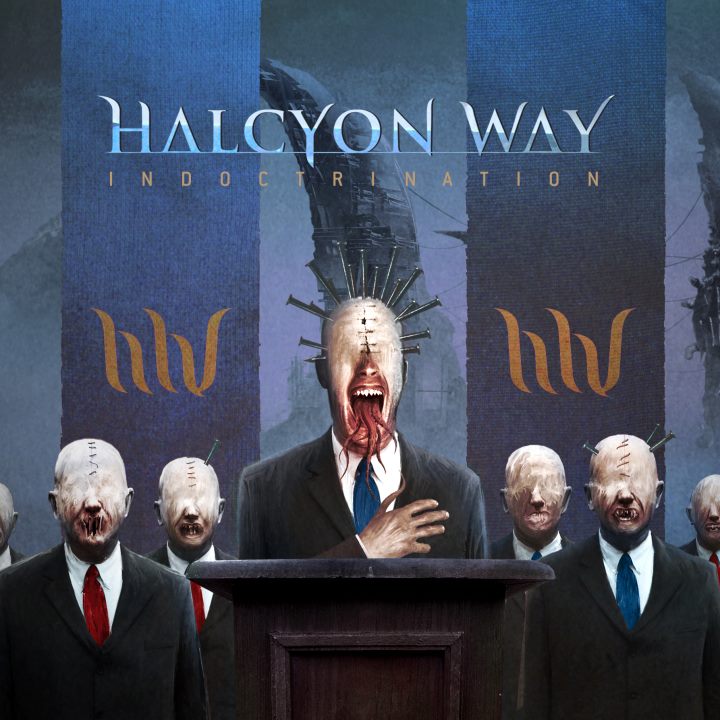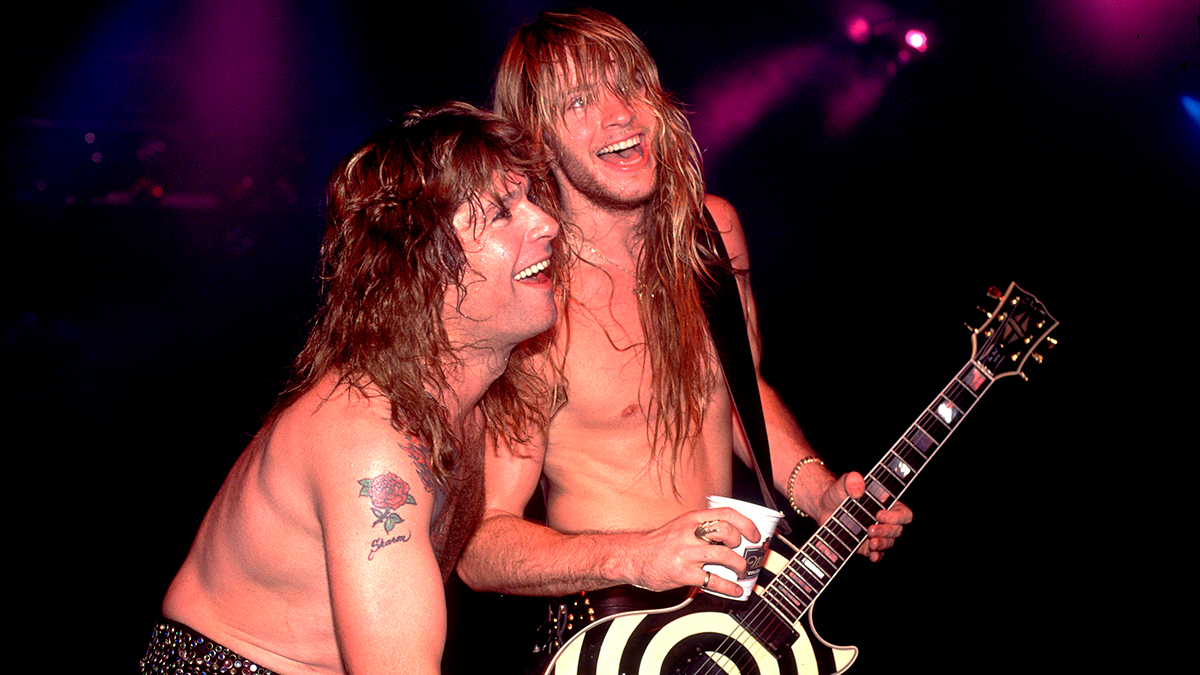
We have another great premiere for you this morning as we're rolling out a brand-new track from Atlanta's Halcyon Way, titled "Our Finest Hour." You can check it out below.
"Our Finest Hour" comes from the band's latest album, IndoctriNation, which is out on October 25 via Nightmare Records.
Be sure to check out Halcyon Way at their official website, follow them on Twitter and give them a "Like" on Facebook.
As an added bonus, we talked to Halcyon Way lead guitarist Jon Bodan about the meaning behind "Our Finest Hour," gear, the Atlanta metal scene and more! Check out the full interview below the stream.
We’re debuting the track “Our Finest Hour” on GuitarWorld.com. What can you tell me about the inspiration behind that song?
JON BODAN: First, thanks for the support, we really appreciate it! Lyrically, it's in keeping with the other material on Building The Towers and IndoctriNation, which is to say that it's a commentary about the state of the nation. Basically a look at how things are so divided between left and right, and how things could improve if we could somehow meet in the middle and simply agree to disagree on certain things. It's got political content but it's non-partisan and not pushing any agenda.
Musically, it's really got a lot of the elements that we're known for – it's got heavy riffs, strong melodies and a big hook with vocal harmonies, lots of cool drum stuff, and some catchy guitar lines. We try to make our songs as heavy as we can, but keep them interesting, catchy, and flowing. We're all about writing a great song first and foremost, and making sure it's hooky and accessible, even if it's just super heavy, like "Rise To Revise" off Building The Towers, for example.
All the latest guitar news, interviews, lessons, reviews, deals and more, direct to your inbox!
The way we see it, most progressive metal these days is really stale, and we try to keep it fresh by bringing in all sorts of different influences – our drummer and bassist have a black metal side project – my first band did death metal and I came up as a player on Bay Area Thrash.
I have an electronic side project as well. So we view ourselves as being progressive, but in a different way. If you can make a transition from a death metal part with a blast beat to a catchy pop hook over a thrashy guitar riff, and have it sound cohesive and natural, you've accomplished something!
What was your songwriting process like for the album?
We write in a number of ways –- sometimes one of us will come into the writing sessions with a complete song and we all just put our individual stamps on it, while sometimes a song will come together by us all throwing ideas out and jamming something. Sometimes Ernie and I will just get together and work out parts between the two of us, and then we'll incorporate it into other songs. That happens with more complicated passages a lot. "Our Finest Hour" was really a combination of them all -– we jammed out the intro and verses, the pre-chorus and the chorus I came up with outside rehearsal, and the heavy bridge was something Ernie and I cooked up.
One thing that happened was that when Sean left the band, we had to write him out of the material, and it put us under the gun because of some deadlines we were under at the time. So Steve and I had to significantly rework a lot of the material in a short amount of time, but we have no regrets because it made the album a lot better as a result. Some of my favorite things that Halcyon Way have done came as a direct result of that, like the choruses in "IndoctriNation".
IndoctriNation is called a continuation of Building the Towers. What made you want to further explore the sounds and themes you began with that album?
It was a really natural thing – when we did Building The Towers, we wrote a ton of material, and killed what we thought was weak before we even made it to the studio. So when we started tracking it, we had a mountain of songs that we felt strongly about. So we recorded all of it, with the intention that it was either going to be a double CD release, or two separate albums. We decided to go with 2 albums as it turned out. The way it played out was that we picked the songs for the best flow on Building The Towers, got that album released, and pretty much immediately went to work on the art & mixdown for IndoctriNation.
Talk a bit about the gear used on the album.
I have an endorsement with Brian Moore Custom Guitars, so I used those pretty exclusively on the album. We used an i8 with EMG 81/85 pickups at 18v for the rhythm guitars. We quad tracked the rhythms as well. Then for the leads I usually used my C55 Custom Shop with EMG 81/85s, again wired at 18v. There were a couple of spots where I needed a passive tone, and for that stuff I used my Ernie Ball John Petrucci model, because all my Brian Moores are loaded with the EMGs.
Since we tracked the CD, I got a C90 Custom Shop that they built for me that's just sick, it's got our logo inlaid in brushed aluminum on the neck, some diamond plate armor, it's just insane. A really unique looking guitar, and it sounds and plays incredible.
For amps, I used the Axe-FX standard for all the tracking, and then our producer Lasse Lammert reamped into a Bogner Uberschall and a Mesa Dual Rectifier, Rev F I think. He went into a Recto cabinet as well. I believe that there was a Tube Screamer in front of both amps too. The clean stuff and some of the leads were the Axe-FX on the CD, and some of the other leads were reamped through a VHT Pittbull. Live I play a Framus Cobra rig, it's a really sweet amp and I just signed an endorsement deal with them, so I expect to use it on the next CD.
I play pretty dry, so if there were any effects –- like the intro to "The System" -- it was from the Axe-FX. Anything else like delays or reverbs would have been added in mixdown. Live all I use is my Cobra head, with a Tube Screamer in front of it for some bite, and a noise suppressor. I don't use any reverb or delay or anything at all.
How did you end up choosing the Steel Dragon tune to cover? Were there other cover ideas thrown around?
It's kind of a funny story. Basically, when our original vocalist left after A Manifesto For Domination came out in 2008, our singer Steve joined the band literally like 8-9 days later. We did a pretty big festival called Pathfinder Metalfest here in Atlanta as our first show with him, and we knew we had to come out swinging so there'd be no doubt about the 'new guy', you know?
So we were kicking around ideas on how to do that, and Ernie suggested that we do "Stand Up" because of the big vocal moments. So we decided to do it, and thought it would be fun too. So we do the show, and people went berserk when we did it… so it was a live staple for a while for us, and we decided to cut the song in the studio for fun.
We've kicked around some other cover songs –- we used to do some Dio, we did a KISS song -- we actually did a really killer heavy version of "Sunglasses At Night" for a while if you can believe that! But for right now we're really just doing our own material because we have so much to draw from now. I do think at some point we'll go in and cut some covers for fun, though. Maybe put them out digitally for the fans or something.
How did the idea to release a remix of “The System” come about? Remixes aren’t too common in the heavy metal world…
[Laughs] That one kinda came out of left field. When I got sick right when Building The Towers came out, and was spending a lot of time at home, I usually went in my studio every morning and wrote material or did something productive. One of the things I'd always wanted to do was to work on some Electronic music. I've always liked bands like Zeromancer, Assemblage 23, Celldweller, and so on –- so I started working on some things like that.
At the same time, we were getting the stems from Lasse for RockBand to get that stuff authored for the game. So I decided to take the stems and work on a remix for fun. Well, we felt it turned out pretty killer and so we decided to put it on the album. We knew some people wouldn't get it or dig it, but we wanted to do it anyway.
It's different, and it takes balls to do something like that. Actually working on that type of music inspired me to write some things in that genre, so I'm working on a solo project that's kind of like hard rock with electronica elements. I do that under the name karbonBlack. I also did a remix for the band RAUNCHY from Denmark that was a lot of fun, because they're one of my favorite bands right now.
The Atlanta heavy metal scene seems to be thriving these days, how have you seen in change in the years since the band formed?
The scene in this area is definitely a lot better than it used to be; when we formed in 2001 it was a desert wasteland. But what's strange about it is that it's pretty fragmented. You have a rock scene, and a death metal scene, and a crust scene, and then a melodic/power type of scene. And they don't really mix it up too often, so it's hard to branch out from one part to another. So when we do play locally, we try to draw on all those scenes at the same time to get a more diverse crowd.
For example, we're headlining a cancer benefit show on October 15, and we booked a death metal band, an industrial rock band, a thrash band, a ska band and an old-school rock band. We're very heavy live, and we put on a show with a lot of energy, so we're not afraid to share the stage with anyone, really. But in Atlanta, there's a lot of urban sprawl so it's still not easy to get people out to a show. We were really shocked at the European dates we did last year because the places were just packed out, and that doesn't happen too often in the States.
Josh Hart is a former web producer and staff writer for Guitar World and Guitar Aficionado magazines (2010–2012). He has since pursued writing fiction under various pseudonyms while exploring the technical underpinnings of journalism, now serving as a senior software engineer for The Seattle Times.

